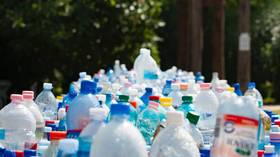Major breakthrough as scientists turn plastic into fuel using 50% less energy & without adding CO2 to atmosphere

Researchers from the University of Delaware (UD) claim to have created a potentially revolutionary system for repurposing plastic waste more efficiently – and safely – than ever before.
The UD scientists begin their paper with some rather galling statistics about the state of play when it comes to plastic recycling efforts in the US: Just 9% of plastic waste ever produced in the US has been recycled, while approximately 16% has been burnt – meaning that, sadly, over 75% of all plastic waste ends up in landfills.
Efforts to reduce or replace plastic use have so far faltered due its ubiquity in global supply chains, its low cost and ease of production, and a lack of viable, scalable alternatives.
However, by combining two existing methodologies for breaking plastic down, which on their own would be largely ineffective, the researchers may well have cracked the code of one of the most common types of plastic – polyolefin.
Their technique is capable of “convert[ing] different common plastic wastes, including low- and high-density polyethylene, polypropylene, polystyrene, everyday polyethylene bottles and bags, and composite plastics to desirable fuels and light lubricants.”
Also on rt.com Global recycling crisis shows West can’t use poorer countries as dumping groundsWhile this is definitely not the first time such techniques have been developed, the researchers claim their approach far outperforms existing methods, in several crucial areas.
Firstly, it uses 50% less energy, key to making plastic reclamation a sustainable industry in terms of cost. Second, it can be achieved at temperatures possible in a consumer oven, as low as 225 degrees Celsius (427 Fahrenheit).
Lastly, and rather crucially, the process doesn't add any additional CO2 to the atmosphere.
With global plastic production reaching 314 million tons in 2014 and expected to surpass 1,200 million tons by 2050, any efficient and cost-effective methods to reduce new original plastic production will be key to rebalancing and cleaning up the environment.
The specific technique the UD researchers used is called hydrocracking, a chemical process used to break the carbon bonds within the plastic using a concoction containing mixed metal oxides, which break down large molecules, and minerals known as zeolites which allow for the formation of branched molecules, critical to repurposing the material.
“We report a direct method to selectively convert polyolefins to branched, liquid fuels including diesel, jet, and gasoline-range hydrocarbons,” the researchers wrote.
One of the scientists, UD biomolecular engineer Dion Vlachos, took it a step further, saying: “the combination does magic, melting the plastics down and leaving no plastic behind.”
To sweeten the deal even further, according to the researchers, different types of plastics do not need to be separated, further reducing the barriers to deploying and scaling the technology, and placing the possibility of creating a circular plastic/hydrocarbon economy within reach.
The researchers caution, however, that this technology, once it matures, is not enough in isolation to cure the world of the disease of plastic waste. It can only truly create a circular economy once original plastic production stops.
Think your friends would be interested? Share this story!














